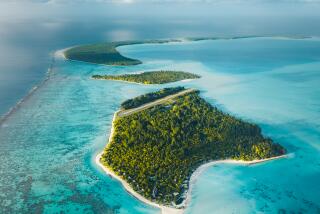Antarctica’s Mr. Clean
- Share via
BRIAN BIRKENSTEIN mops floors in Antarctica, but he is not a professional janitor.
He graduated in 1996 from UCLA with a bachelor’s degree in geography, traveled the world as a tour guide, then applied for a cleaning job way down under because he wanted to see Antarctica.
Why pay thousands of dollars to take an Antarctic cruise, he figured, when you can collect $7 an hour for cleaning toilets at McMurdo Station?
Raytheon Polar Services Co., a Centennial, Colo.-based contractor, hires about 1,000 people every year to perform support work for the U.S. Antarctica Program’s field camps, research vessels and three permanent stations, including McMurdo on the southern tip of Ross Island.
“We hire everyone needed to run a small town,” Raytheon’s Elaine Hood told me by e-mail, “cooks, janitors, plumbers, electricians, computer technicians, snowplow drivers, construction workers, secretaries.”
Workers are trained, then transported to the research facilities. They’re equipped with big red parkas, insulated overalls, gloves, neck warmers, hats and goggles.
“People who work outdoors get more stuff,” said Birkenstein, a native of Fountain Valley.
Before he took the job, his mother warned him that he wouldn’t be able to wear flip-flops. But when I talked to Birkenstein by phone in early December, it was 37 degrees and sunny at McMurdo, near the relatively temperate Antarctic Peninsula.
“I walked to the bowling alley in flip-flops today,” he told me.
Here is some of our conversation with him:
What does the base look like?
The station is [home to] about 1,000 people, set on a hill overlooking the frozen-over sea. It is on an island about 20 miles from the mainland. There are 100 or so buildings -- dorms, warehouses, workshops, a medical facility, firehouse, chapel, cafeteria and three bars. We even have saunas, weight rooms and a bowling alley with two warped lanes and a manual pin setup.
Most people live in dorms with one to three roommates. It is as comfortable as can be expected for shared living in the coldest, driest, most isolated continent on Earth.
Do you get cold?
In my room, I actually sleep with a fan on, partly for white noise and partly to cool it down a bit. The weather is cold by most standards, but you adjust.
The sun never goes down and won’t for a few months. Then it will be dark and really cold for the long winter, but I will be gone by then. Some people winter over; however, I think they’re of hearty, non-Californian stock.
What’s your routine?
I work six days a week, 7:30 a.m. to 5:30 p.m. I clean the same dorm every morning and the coffeehouse every afternoon. I do it over and over. It’s like that Bill Murray movie “Groundhog Day.”
Do you ever go outside?
I’m always walking between buildings and try to take a hike once a week. There are four or five trails and roads around the station. One goes to Scott, the New Zealand base a few miles away.
What do you do for fun?
Everyone thought they’d catch up on reading down here, but there are a million activities. The recreation department is busy. My favorites are off-base excursions. I saw the hut used by [Capt. Robert Falcon] Scott at Cape Evans and a pressure ridge, where the land has pushed the sea ice into ridges. Last night I went to an old plane-crash site. It’s mostly just to get off base, to look at white in a different place.
We also have costume events. There was a skirt party at Scott Base. Everyone had to wear skirts, even [director] Werner Herzog, who is down here working on a documentary. Some of the men came in full drag.
Are there any women?
I’d say the female-male ratio is about 30-70. A lot of romances start, and some end well. But I’ve also heard that some people have “ice relationships” here and regular ones back home.
Besides at the skirt party, have you spotted any wildlife?
I’ve seen penguins from far away, a seal close-up and lots of skuas. They’re scavengers, like seagulls. They have been known to attack people taking trays of food from the galley to the dorms.
“Skua” is used as a verb down here, as in, “Hey, man, can you skua me a pair of boots?” It means reusing old stuff. We don’t have any Wal-Marts or Targets, so things get passed around.
Have you seen any tourists?
People from three cruise ships were scheduled to come to McMurdo, and I volunteered to show them around. I have worked as a tour guide all over North America, so it’s second nature. But the first group was canceled because of bad weather.
What are your fellow workers like?
They say you come down here the first year for adventure, the second for money and the third because you don’t fit in anywhere else.
Is that true of you?
When I graduated from college, I went to Australia for a trip that was supposed to be my last fling before coming home, cutting my hair and getting a real job. But I became addicted to travel.
Do you ever feel stir-crazy?
It ebbs and flows. My main goal was to get to Antarctica, but right now I want to go home. You know how they say the best things about owning a boat are the days when you buy and sell it? Being here is like that. The best days are when you arrive and leave.
People have a hard time imagining what Antarctica is like. Is there anything you can say to help them?
There are no polar bears here. And we are down, not up.
More to Read
Sign up for Essential California
The most important California stories and recommendations in your inbox every morning.
You may occasionally receive promotional content from the Los Angeles Times.













